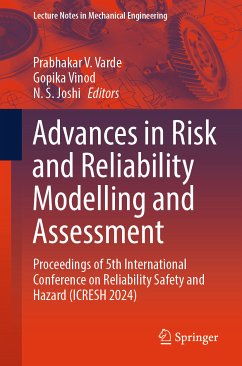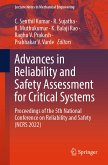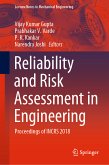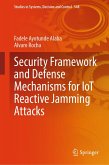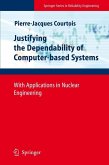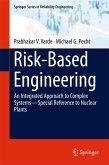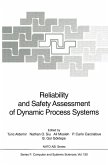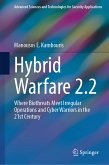Advances in Risk and Reliability Modelling and Assessment (eBook, PDF)
Proceedings of 5th International Conference on Reliability Safety and Hazard (ICRESH 2024)
Redaktion: Varde, Prabhakar V.; Joshi, N. S.; Vinod, Gopika


Alle Infos zum eBook verschenken

Advances in Risk and Reliability Modelling and Assessment (eBook, PDF)
Proceedings of 5th International Conference on Reliability Safety and Hazard (ICRESH 2024)
Redaktion: Varde, Prabhakar V.; Joshi, N. S.; Vinod, Gopika
- Format: PDF
- Merkliste
- Auf die Merkliste
- Bewerten Bewerten
- Teilen
- Produkt teilen
- Produkterinnerung
- Produkterinnerung

Hier können Sie sich einloggen

Bitte loggen Sie sich zunächst in Ihr Kundenkonto ein oder registrieren Sie sich bei bücher.de, um das eBook-Abo tolino select nutzen zu können.
This book presents the proceedings of the 5th International Conference on Reliability Safety & Hazard-2024, held in Mumbai during February 21-24, 2024. It covers the latest advances in artificial intelligence and machine learning in development of risk-conscious culture. Various topics covered in this volume are reliability prediction, precursor event analysis, fuzzy reliability, structural reliability, passive system reliability, digital system reliability, risk-informed approach to decision making, dynamic PSA, uncertainty and sensitivity modeling, among others. The book is a valuable…mehr
- Geräte: PC
- ohne Kopierschutz
- eBook Hilfe
- Größe: 25.24MB
![Advances in Reliability and Safety Assessment for Critical Systems (eBook, PDF) Advances in Reliability and Safety Assessment for Critical Systems (eBook, PDF)]() Advances in Reliability and Safety Assessment for Critical Systems (eBook, PDF)105,95 €
Advances in Reliability and Safety Assessment for Critical Systems (eBook, PDF)105,95 €![Reliability and Risk Assessment in Engineering (eBook, PDF) Reliability and Risk Assessment in Engineering (eBook, PDF)]() Reliability and Risk Assessment in Engineering (eBook, PDF)177,95 €
Reliability and Risk Assessment in Engineering (eBook, PDF)177,95 €![Security Framework and Defense Mechanisms for IoT Reactive Jamming Attacks (eBook, PDF) Security Framework and Defense Mechanisms for IoT Reactive Jamming Attacks (eBook, PDF)]() Fadele Ayotunde AlabaSecurity Framework and Defense Mechanisms for IoT Reactive Jamming Attacks (eBook, PDF)105,95 €
Fadele Ayotunde AlabaSecurity Framework and Defense Mechanisms for IoT Reactive Jamming Attacks (eBook, PDF)105,95 €![Justifying the Dependability of Computer-based Systems (eBook, PDF) Justifying the Dependability of Computer-based Systems (eBook, PDF)]() Pierre-Jacques CourtoisJustifying the Dependability of Computer-based Systems (eBook, PDF)161,95 €
Pierre-Jacques CourtoisJustifying the Dependability of Computer-based Systems (eBook, PDF)161,95 €![Risk-Based Engineering (eBook, PDF) Risk-Based Engineering (eBook, PDF)]() Prabhakar V. VardeRisk-Based Engineering (eBook, PDF)73,95 €
Prabhakar V. VardeRisk-Based Engineering (eBook, PDF)73,95 €![Reliability and Safety Assessment of Dynamic Process Systems (eBook, PDF) Reliability and Safety Assessment of Dynamic Process Systems (eBook, PDF)]() Reliability and Safety Assessment of Dynamic Process Systems (eBook, PDF)161,95 €
Reliability and Safety Assessment of Dynamic Process Systems (eBook, PDF)161,95 €![Hybrid Warfare 2.2 (eBook, PDF) Hybrid Warfare 2.2 (eBook, PDF)]() Manousos E. KambourisHybrid Warfare 2.2 (eBook, PDF)105,95 €
Manousos E. KambourisHybrid Warfare 2.2 (eBook, PDF)105,95 €-
-
-
Dieser Download kann aus rechtlichen Gründen nur mit Rechnungsadresse in A, B, BG, CY, CZ, D, DK, EW, E, FIN, F, GR, HR, H, IRL, I, LT, L, LR, M, NL, PL, P, R, S, SLO, SK ausgeliefert werden.
- Produktdetails
- Verlag: Springer Nature Singapore
- Seitenzahl: 895
- Erscheinungstermin: 31. Mai 2024
- Englisch
- ISBN-13: 9789819730872
- Artikelnr.: 70882493
- Verlag: Springer Nature Singapore
- Seitenzahl: 895
- Erscheinungstermin: 31. Mai 2024
- Englisch
- ISBN-13: 9789819730872
- Artikelnr.: 70882493
- Herstellerkennzeichnung Die Herstellerinformationen sind derzeit nicht verfügbar.
